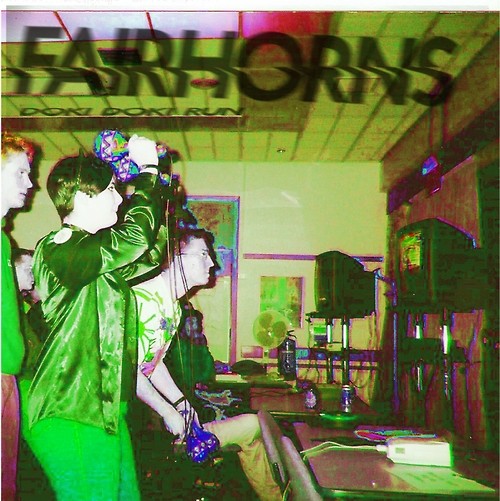
Although he may have been endowed with a preternaturally deft ear for sumptuous mellifluousness (that his collab with the garrulous Ariel Rosenberg be polemically entitled Ku Klux Glam yet not only become culturally acceptable but also highly affable to ears inundated with wave upon wave of indiscernible blog ebb ought attest to that) it's hard not to feel as though his talents have oft been spurned in favour of concerted subversion. Inevitably Moore here goes for a few Hi Fives which land a little awry: the dark Salford synthpop slump of Big Mistake grates as much as the segueing acoustic meander of The Winner is incontestably great, whilst his scruffy lamenting of a lack of "girls", "love" and "trucks" in life on Find Any takes the Lo Fi vibe to an unendurable extreme. Chugging through the gears of condensed buzz saw guitar and synths picked up from the Pet Shop Boys' flouncy storefront, the latter provides an arresting ending to this compendium of sorts yet it's one you wish would truck off a minute or so into its protracted, gruesomely repetitious four and as Moore quizzes on another inexcusably scrappy track called Show Biz Is Dead: "How much music can we take in terms of running time?" he here overruns, hereby answering his own quietly self-effacing inquisition. Exhibitions of sanity slipping through Moore's curled fingernails these may be therefore, but there's tunage worth grappling with and grasping if possible among the maddening mêlée.
Whether that be the ELO-esque histrionics of retrospectacular opener Pop Music which is, joyously unashamedly, just that or the thunderous jitter to Hurry Up which arouses midway through the overall running time like a Sebadoh-stained wet dream atop Pontins bunk, Moore's indisputably got it. I mean he's seemingly lost it, although musically? It's wondrous stuff. The synthetic flutes of I Got into Your Mind kiss trip hop snares and strings so rich you sense they could only possibly be sampled in an amalgam that's as though Millennium-turn F'Lips smooching with The Avalanches whilst the Antipodeans swipe The White Album. The intoxicating fumes of Rosenberg's Haunted Graffiti get all up in Moore's grill on the peppy Why Should I Love You and rather more placid, euphemistic Dutch Me. Little Man then scintillates as though a perfectly formed pop nugget excavated from Zager & Evans' glinting trove now inhumed in time. Thus late '60s and early '70s referencing becomes pretty omnipresent, and indeed Moore irrefutably belongs to another epoch. Whether that be one indexed in any old clunk of history textbook is rather less conclusive although textbook is precisely what the breezy vibes to Here Comes the Summer Again seem. Moore's studied infatuation with The Beach Boys here forever incarnate in a gooey blur of retrospection as indebted to Smile as it is to N64 soundtrack ensnared in plastic cartridge, these be minutes worthy of dissertational explication.
Similarly, the dichotomy between Daniel Johnston-styled sketch (the both gawky and Gorky's Another Day Slips Away) and downright sketchy (the ludicrously curt ending to the Lemonhead-scented rollick of You and Me, say) is one worthy of footnoting although essentially, Moore ought now be appreciated and with it admired as is Johnston as a tutor of his beloved Lo Fi. Stick this one in your Pitchfork and smoke it 'til helplessly stoned then, yeah?
























